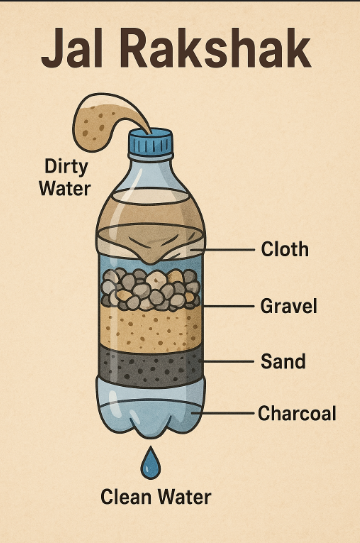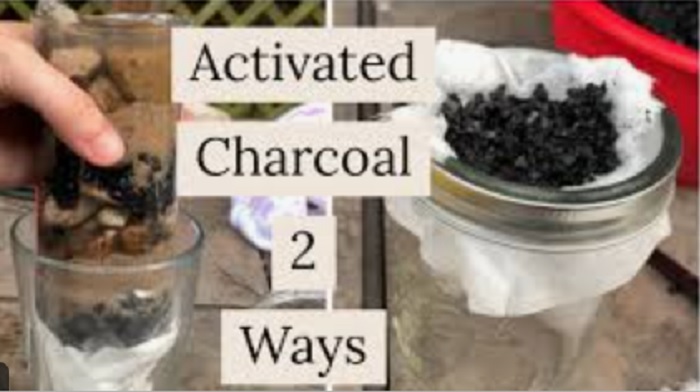Have you ever wondered how charcoal can make your drinking water cleaner and safer? Charcoal isn’t just for barbecues—it plays a powerful role in water purification.
If you want to understand how this simple material helps remove harmful substances from your water, keep reading. By the end, you’ll know exactly why charcoal is a trusted choice for improving water quality and how it can protect your health every day.

Credit: gosharpener.com
Charcoal Basics
Charcoal is a black, porous material made by burning wood or other plants. It has been used for a long time to clean water.
It works by trapping harmful substances in its tiny holes. This helps make water safer to drink.
Types Of Charcoal Used
There are different types of charcoal used for water purification. Each type has unique features that help clean water.
Activated charcoal is the most common type. It is treated to have many small pores that trap impurities.
- Activated charcoal: Made from wood, coconut shells, or coal and treated with heat.
- Raw charcoal: Simple burned wood without special treatment, less effective.
- Charcoal granules: Small pieces that offer more surface area for cleaning.
Properties That Aid Purification
Charcoal has special properties that help remove bad stuff from water. These make it good for filtering.
Its porous surface traps chemicals, dirt, and bad smells. Charcoal also helps kill some germs.
- High surface area: More space to hold impurities.
- Porosity: Tiny holes trap particles and chemicals.
- Adsorption: Charcoal pulls and holds pollutants onto its surface.
- Neutral taste: Does not add bad flavors to water.
How Charcoal Purifies Water
Charcoal is a natural material used to clean water. It helps remove dirt and bad smells. Many people use charcoal to make water safer to drink.
Charcoal works in different ways to clean water. It can trap harmful substances and reduce germs. This makes water clearer and healthier.
Adsorption Process
Charcoal cleans water mainly through adsorption. This means pollutants stick to the surface of charcoal. The large surface area of charcoal helps trap many particles.
Charcoal’s tiny pores create space for contaminants to cling onto. Water passes through charcoal, leaving impurities behind. This process does not add anything harmful to the water.
Removal Of Contaminants
Charcoal removes chemicals and bad tastes from water. It can absorb chlorine, pesticides, and some heavy metals. This makes water safer and more pleasant to drink.
- Chlorine and chloramine
- Volatile organic compounds (VOCs)
- Some heavy metals like lead
- Bad odors and tastes
Charcoal is less effective against salts and minerals. It works best to remove organic and chemical pollutants.
Effectiveness Against Microorganisms
Charcoal can reduce some germs in water. It traps bacteria and some viruses on its surface. This lowers the number of harmful microorganisms.
Charcoal alone may not kill all germs. It works better combined with other treatments like boiling or filtering. This helps make water safer to drink.
Benefits Of Charcoal In Water Treatment
Charcoal is widely used to clean and purify water. It helps remove harmful substances and improves water taste.
Its natural properties make it a useful and safe option for water treatment in many areas.
Cost-effectiveness
Charcoal is affordable and easy to produce from natural materials like wood or coconut shells. It costs less than many chemical water treatments.
Because charcoal can be reused after cleaning, it saves money over time. It works well for both small and large water purification needs.
Environmental Impact
Charcoal is made from renewable resources and breaks down naturally. It does not add harmful chemicals to the water or environment.
Using charcoal reduces waste and pollution. It is a green choice for treating water safely and responsibly.
Ease Of Use
Charcoal is simple to use for water purification. It can be placed in containers or filters without special tools.
People can use charcoal at home or in the field. It does not require training and works quickly to clean water.
Limitations And Challenges
Charcoal helps clean water by trapping dirt and chemicals. It is useful but has some limits. These limits affect how well it works over time.
Understanding these challenges helps us use charcoal better for water purification.
Capacity And Lifespan
Charcoal can hold only a certain amount of impurities before it stops working. This is called its capacity. Once full, it can no longer clean water well.
The lifespan depends on water quality and usage. Frequent use or very dirty water shortens its life.
- Charcoal must be replaced regularly
- Overused charcoal can release trapped pollutants back
- High impurity levels reduce effective lifespan
Not Effective Against All Pollutants
Charcoal removes many chemicals and odors. It works well with chlorine and organic compounds. It does not remove all harmful substances.
It cannot remove heavy metals, salts, or bacteria fully. Other treatment methods may be needed for these pollutants.
- Does not kill bacteria or viruses
- Cannot remove dissolved salts or minerals
- Not effective for heavy metals like lead
Maintenance Requirements
Charcoal filters need regular cleaning or replacement. Dirt and particles can clog the charcoal and reduce flow.
Proper maintenance ensures charcoal works well and lasts longer. Neglect can cause poor water quality.
- Replace charcoal after it reaches capacity
- Clean filter housing to avoid clogging
- Monitor water taste and smell for signs of failure
Innovations In Charcoal Water Filters
Charcoal has long been used to clean water. New innovations improve how charcoal filters work. These changes make water safer and cleaner.
Advances in charcoal technology help remove more dirt and chemicals. Combining charcoal with other methods makes filters stronger.
Activated Charcoal Advances
Activated charcoal has tiny pores that trap impurities well. Recent advances increase its surface area. This helps catch smaller particles and chemicals.
Scientists now create activated charcoal from new materials. These include coconut shells and wood waste. This makes filters more eco-friendly and effective.
- Improved pore structure for better absorption
- Use of sustainable raw materials
- Longer filter life with less clogging
Combining Charcoal With Other Technologies
Charcoal works well alone but is stronger with other methods. Combining charcoal with UV light kills bacteria faster. Adding ceramic layers removes more dirt.
Some filters mix charcoal with ion exchange resins. This removes heavy metals and salts. These combinations create cleaner and safer water.
- Charcoal plus UV light for bacteria removal
- Charcoal and ceramic filters for dirt trapping
- Charcoal with ion exchange for metal removal

Credit: zerowastestore.com
Practical Applications
Charcoal is widely used to clean water. It removes harmful substances and improves taste.
Its porous surface traps impurities and chemicals. This makes water safer for daily use.
Household Water Filtration
Many homes use charcoal filters to purify tap water. These filters reduce chlorine and bad odors.
Charcoal also removes some pesticides and heavy metals. This helps protect family health.
- Charcoal filters fit in pitchers and faucet attachments
- They improve water taste and clarity
- Filters need regular replacement for best results
Emergency And Outdoor Use
Charcoal is useful in emergencies to clean unsafe water. It can remove harmful chemicals and odors.
Outdoor enthusiasts use charcoal water filters while camping or hiking. These filters are portable and easy to use.
- Lightweight charcoal filters fit in water bottles
- They help remove dirt, bacteria, and bad smells
- Filters provide safer drinking water in remote areas
Industrial And Municipal Systems
Large-scale water treatment plants use charcoal to clean water for cities. Charcoal removes toxic chemicals and organic materials.
Industries use charcoal to treat wastewater before release. This prevents pollution and protects the environment.
- Charcoal filters remove pesticides and industrial waste
- They improve water quality for millions of people
- Regular maintenance keeps these systems effective

Credit: www.amazon.co.uk
Frequently Asked Questions
How Does Charcoal Purify Water?
Charcoal purifies water through adsorption, trapping impurities on its porous surface. It removes contaminants like chlorine, sediment, and volatile organic compounds. This process improves water taste and odor. Activated charcoal, with its increased surface area, enhances purification efficiency. It’s a natural, effective method for cleaner and safer drinking water.
Is Charcoal Effective Against Bacteria In Water?
Charcoal is not effective in removing bacteria from water. While it adsorbs impurities like chemicals and odors, it doesn’t eliminate pathogens. For complete water purification, combine charcoal with other methods like boiling or UV treatment. This ensures harmful microorganisms are effectively removed, providing safe drinking water.
What Types Of Charcoal Are Used In Purification?
Activated charcoal is primarily used for water purification. It is processed to increase its surface area, enhancing adsorption capabilities. This type effectively removes impurities, odors, and chemicals. Regular charcoal is not as effective due to its limited adsorption properties. Activated charcoal is preferred for optimal water purification results.
Can Charcoal Remove Heavy Metals From Water?
Charcoal can remove some heavy metals from water, but not all. It’s effective for metals like lead and mercury, thanks to its adsorption properties. However, it might not fully eliminate all types. For comprehensive removal, use charcoal alongside other filtration methods, ensuring safer and cleaner drinking water.
Conclusion
Charcoal helps clean water by trapping dirt and bad smells. It works by holding tiny particles inside its many holes. This makes water safer and tastes better. People use charcoal in homes and industries for water cleaning. It is a natural and low-cost choice.
Using charcoal can protect health and reduce water problems. Clean water is important for life and well-being. Charcoal plays a simple but strong role in water purification.

